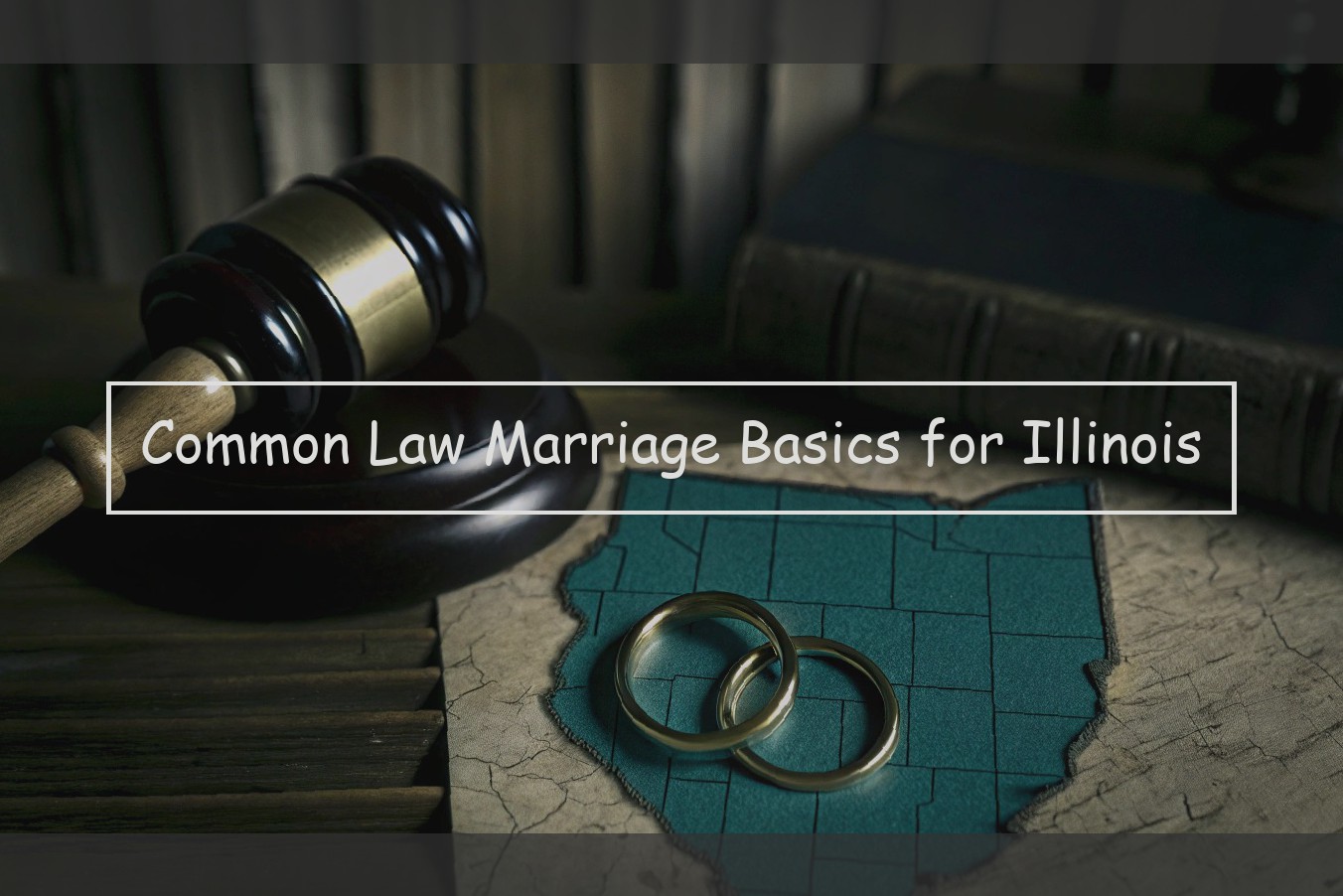
What is a common law marriage?
Common law marriage is a type of relationship that has less strict requirements than a traditional marriage. It is not objectively defined, as there is no one line that splits married and unmarried couples, so the parameters are strictly a legal and historical matter. Strictly speaking, common law marriage designates a legal status, not an emotional or relational one. Couples who have had their union recognized by the state as a valid marriage contract have presumably satisfied every requirement for traditional marriage set forth by their state government, such as parental consent or blood tests.
Illinois abolished common law marriage in 1905 , which means no couple can jointly possess this marital status as if they were legally married in the eyes of Illinois law. However, the state recognizes and preserves the old "common law marriages" that were made prior to the termination of this status in Illinois. More modem couples tend to pursue civil unions or one of the other alternative relationship statuses that are now available, like domestic partnerships, but common law marriages are easily recognizable. If two adults lived in Illinois and held themselves out to the community as a married couple, then the court is likely to recognize their marital status.
What does Illinois say about common law marriage?
Illinois historically did not recognize common law marriages, however, in recent years, several court opinions have indicated that there may be exceptions to common law marriages being mollusively prohibited in all situations. In People v. Dominguez, 166 Ill. 2d 204 (1995), the Illinois Supreme Court addressed the question of whether there exists a common law marriage in Illinois when the marriage took place in a state where it is legally recognized (in that case, Minnesota). The Illinois Supreme Court found that the common law marriage which had occurred out of state was recognized, even though Illinois has now suspended any future recognition of common law marriages. The Court stated that to disallow recognition would essentially "repudiate an obligation which the State chose to recognize by statute," and "would preclude federal benefits." Further, the Court held that to "allow an otherwise lawful marriage to be terminated solely because of jurisdictional boundaries would be to exalt form over substance."
Prior Illinois Appellate Court opinions have relied upon this analysis in deciding similar issues. For example, in People v. Johnson, 152 Ill.App.3d (1987), the Illinois Appellate Court granted an exception to the prohibition on common law marriage in Illinois. The Court found no "compelling state interest in terminating the husband’s paycheck protection benefits when the parties continue to cohabitate on the basis of their Minnesota marriage."
Further, in Town of Cicero v. Alvarez, 341 Ill.App.3d 309 (2003), the Illinois Sixth District Appellate Court held that a marriage which occurred in Wisconsin prior to 2010 was validly recognized in Illinois. However, in an unpublished opinion from the Illinois Fourth District Appellate Court, In re Marriage of Lesnau, 2011 IL App (4th) 090769-U, the Court found that although the common law marriage occurred in Iowa, Illinois public policy prohibits recognition of common law marriage where such a marriage violated a statute whose purpose is to advance public policy. This Court appeared to revisit the analysis in People v. Dominguez, and distinguished other cases based upon differences in Illinois and Iowa statutory schemes.
Illinois’ exceptions and recognition of common law marriages from other states
Common law marriages that were established in states where common law marriages are recognized, are fully and legally recognized under Illinois law. For example, the Illinois Appellate Court has ruled that a marriage formed under Iowa law may be recognized in Illinois when there is a "common law marriage which was established in Iowa prior to April 4, 1980," and does not violate Illinois public policy. The issue that often arises is what happens where the parties are residents of Illinois and do not have any relationship to the state allowing for it’s recognition. One such case considered whether a couple who had established their marriage in Texas, and who subsequently moved to Illinois, was entitled to a divorce in Illinois. The parties had resided in Texas from the year 2000 until 2011, establishing their common law marriage in Texas during that period. The parties moved to Illinois in 2011, but did not take any affirmative steps to change their legal residence to Illinois. They maintained their employment and financial ties to Texas, and they alecked that their primary residence was in Illinois but they were just "spending a summer" in Illinois. In 2016, they signed a joint affidavit affirming their intent to establish their residence in Illinois, despite the fact the defendants continued to largely reside in Texas. The defendants filed for divorce after signing the affidavit and attempted to argue that the document was not a full and legal election to be a legal resident of Illinois. The court held that the affidavit was a declaration of their intent to become legal residents of Illinois at a later date, and the affidavit was sufficient to that end, and they were therefore eligible to file and divorce and be granted recognition in Illinois.
Alternatives to common law marriage in Illinois
For couples in Illinois who have shared a home for several years, it can sometimes make sense to acknowledge their union and rights to one another through legal contracts. If a couple does not want to marry but wants to protect their assets and finances, they can enter into a cohabitation agreement, which should be reviewed or written by a qualified family law attorney. Cohabitation agreements can provide for properties, financial matters and children as if the couple were married. Rights of survivorship, custody and support arrangements can be made in such agreements, which aired property, making clear what each party expects from the relationship. The agreements are made to protect both parties if the relationship ends or if one party dies.
If a couple wishes to publicly acknowledge their union , they can enter into a domestic partnership. Under the Illinois Domestic Partners Act, unmarried couples can file a Declaration of Domestic Partnership and be eligible for the same rights, responsibilities and benefits as those partners granted to married couples (depending on the issuing agency). Domestic and civil partners will be considered them under the Illinois Marriage and Dissolution of Marriage Act. While the Illinois Domestic Partners Act was signed into law in 2005 and went into effect in 2006, the dissolution process would require the filing of a Petition for Dissolution of Domestic Partnership.
How to protect your rights without a common law marriage
Even without common law marriage, unmarried couples can still protect their interests and establish rights in several ways. Unmarried couples should consider executing wills to establish the terms of designating guardians for children and how to divide property in the event of death. Because a will is not effective until the testator dies, an individual can revoke it at any time by executing another will or by a codicil revoking a prior will. Unmarried couples may designate powers of attorney that designate an agent to make medical and financial decisions in the event of incapacity. When unmarried, an individual cannot rely on the other to make decisions in an emergency. A valid power of attorney executed by one party designating the other to act in case of an emergency will advance the interests of the parties. When drafting these documents, consider the possibility that the relationship may end; parties should include provisions for termination in the event of a breakup.
Unmarried couples can establish joint titles to bank accounts and other assets. Joint owners can make decisions regarding the property without express authorization; however, one party can sever the joint tenancy unilaterally, thus terminating full ownership of the property by the other. Some people also create a trust, a legal document establishing owners for property and naming a trustee with authority over the asset. A trust will ensure that the assets are distributed according to the wishes of the trustor and that the wishes of the trustor are honored even after death. A trust does not require court involvement to execute. For grandparents with resources and a desire for their grandchildren to inherit property, a trust is a good option because a valid will cannot dispose of property from grandparents to grandchildren in Illinois.
Wills, powers of attorney, and establishing joint tenancy can help protect the interests of unmarried couples during life and after death, but as situations change, those documents should be reviewed and amended often, especially when the relationship deteriorates.
What to do if you think you have a common law marriage
If you believe that you have a common law marriage from another state and you are looking for recognition in Illinois, you must be able to provide the 5 elements to the Court. First, you must show intent to be married. Second, you must show that you moved in together. Third, you must demonstrate continuance of the relationship by cohabitation. Fourth , you must demonstrate that you knew each other well enough to be considered partners. Fifth, you must show that you represent yourselves as married. If you can establish these 5 elements in Illinois (even if you were married by common law in another state), you might be entitled to equitable relief here in Illinois.


